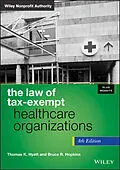A completely revised and expanded one-volume legal resource for
tax-exempt healthcare organizations
A complete and up-to-date legal resource for tax-exempt
healthcare organizations and their advisors, this Fourth
Edition, equips you with a comprehensive, one-volume source of
detailed information on federal law covering tax-exempt healthcare
organizations. The Fourth Edition of this practical,
down-to-earth book tackles complex legal issues by providing you
with plain-English explanations and the appropriate legal citations
for further research.
* Revised with new discussions on healthcare reform, the
Affordable Care Act, IRS initiatives, executive compensation,
commercial activity by tax-exempt organizations, political campaign
activity, charitable reforms, governance, restrictions on
supporting organizations, intermediate sanctions, and much
more
* Provides detailed documentation and citations, including
references to regulations, rulings, cases, and tax literature
* Includes an exhaustive index allowing for quick and easy
reference
* Offers annual supplements to keep readers apprised of the
latest developments affecting tax-exempt healthcare
organizations
Written by leading experts in the fields of healthcare and
nonprofit law, this comprehensive and vital resource has been
completely revised and updated to present a clear view of
complicated legal and tax issues.
Autorentext
THOMAS K. HYATT is a Partnerand the Chair of Dentons US LLP's Health Care practice. He focuses on corporate and tax-exempt organization issues for health care providers. He represents organizations including public and private hospitals, multi-hospital systems, integrated delivery systems, academic medical centers, home health agencies, health maintenance organizations, continuing care retirement communities, provider associations, physician clinics, faculty practice plans, physician-hospital organizations, and shared services organizations. Tom is the Chair Emeritus and serves on the faculty of the annual Tax Issues for Healthcare Organizations seminar sponsored by the American Health Lawyers Association (AHLA), and past chair of AHLA's Tax and Finance practice group.
BRUCE R. HOPKINS is a senior partner with the firm Polsinelli PC and an adjunct professor at the University of Kansas School of Law. He is also the author of more than twenty-eight books, including The Law of Tax-Exempt Organizations, Tenth Edition; Tax-Exempt Organizations and Constitutional Law: Nonprofit Law as Shaped by the U.S. Supreme Court; Nonprofit Law Made Easy; and Private Foundations: Tax Law and Compliance, Fourth Edition, as well as the monthly newsletter Bruce R. Hopkins' Nonprofit Counsel, all published by Wiley.
Zusammenfassung
A completely revised and expanded one-volume legal resource for tax-exempt healthcare organizations
A complete and up-to-date legal resource for tax-exempt healthcare organizations and their advisors, this Fourth Edition, equips you with a comprehensive, one-volume source of detailed information on federal law covering tax-exempt healthcare organizations. The Fourth Edition of this practical, down-to-earth book tackles complex legal issues by providing you with plain-English explanations and the appropriate legal citations for further research.
- Revised with new discussions on healthcare reform, the Affordable Care Act, IRS initiatives, executive compensation, commercial activity by tax-exempt organizations, political campaign activity, charitable reforms, governance, restrictions on supporting organizations, intermediate sanctions, and much more
- Provides detailed documentation and citations, including references to regulations, rulings, cases, and tax literature
- Includes an exhaustive index allowing for quick and easy reference
- Offers annual supplements to keep readers apprised of the latest developments affecting tax-exempt healthcare organizations
Written by leading experts in the fields of healthcare and nonprofit law, this comprehensive and vital resource has been completely revised and updated to present a clear view of complicated legal and tax issues.
Inhalt
Preface xv
About the Authors xvii
Book Citations xxi
Part One Introduction to The Law of Tax-Exempt Healthcare Organizations
1 Tax-Exempt Healthcare OrganizationsAn Overview 3
1.1 Constitutional Law Perspective 5
1.2 Defining Tax-Exempt Organizations 6
1.3 Rationales for Tax Exemption 9
1.4 Categories of Tax-Exempt Healthcare Organizations 13
1.5 Charitable Healthcare Organizations 14
1.6 The Law of Charitable Trusts 16
1.7 Relief of Poverty 16
1.8 Promotion of Health 19
1.9 Social Welfare Organizations 20
2 Advantages and Disadvantages of Tax Exemption 23
2.1 Source of Tax Exemption 23
2.2 Advantages of Tax Exemption 27
2.3 Disadvantages of Tax Exemption 30
2.4 Alternatives to Tax-Exempt Status 32
2.5 No Contract, Third-Party Beneficiaries, Right of Action, or Charitable Trust 34
2.6 Small Employer Insurance Tax Credit 37
3 Criticisms of Tax Exemption 39
3.1 Criticisms in General 40
3.2 Criticisms of Tax Exemption for Healthcare Organizations 43
3.3 Commerciality Doctrine 56
Part Two Fundamental Exempt Organization Principles Applied to Healthcare Organizations
4 Private Inurement, Private Benefit, and Excess Benefit Transactions 71
4.1 Essence of Private Inurement 72
4.2 Requisite Insider 77
4.3 Physicians as Insiders 84
4.4 Private InurementScope and Types 86
4.5 Private Inurement Per Se 104
4.6 Essence of Private Benefit 107
4.7 Private Inurement and Private Benefit Distinguished 113
4.8 A Case Study 113
4.9 Excess Benefit Transactions 116
5 Public Charities and Private Foundations 137
5.1 Public Institutions 138
5.2 Publicly Supported OrganizationsDonative Entities 143
5.3 Publicly Supported OrganizationsService Provider Organizations 150
5.4 Comparative Analysis of the Two Categories of Publicly Supported Charities as Applied to Healthcare Organizations 155
5.5 Supporting Organizations 156
5.6 Recognition of Change in Public Charity Status 172
5.7 Relationships Created for Avoidance Purposes 172
5.8 Income Attribution Rules 173
5.9 Reliance by Grantors and Contributors 173
5.10 Private Foundation Rules 175
6 Community Benefit 179
6.1 Community Benefit and Operation for Charitable Purposes 179
6.2 The Traditional Community Benefit Standard 180
6.3 The New Community Benefit Standard 183
7 Lobbying and Political Activities 193
7.1 Legislative Activities Limitation 193
7.2 Business Expense Deduction Rules and Lobbying 205
7.3 Federal Disclosure of Lobbying 206
7.4 Political Activities Limitation 209
7.5 Business Expense Deduction Rules and Political Activities 218
7.6 Internet Activities 219
7.7 Public Policy Advocacy Activities 222
7.8 Political Activities of Social Welfare Organizations 223
7.9 Constitutional Law Considerations 225
Part Three Tax Status of Healthcare Provider and Supplier Organizations
8 Hospitals 229
8.1 Federal Tax Law Definition of Hospital 229
8.2 Private Charitable Hospitals 234
8.3 Public Hospitals 238
8.4 Religious Hospitals 238
8.5 Proprietary Hospitals 240
9 Managed Care Organizations 243
9.1 Introduction 243
9.2 Health…
